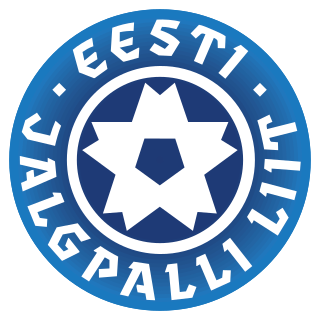
The Estonia men's national football team represents Estonia in international football matches and is controlled by the Estonian Football Association, the governing body for football in Estonia. Estonia's home ground is Lilleküla Stadium in the capital city Tallinn.

The Estonian Football Association is the governing body of football, beach soccer and futsal in Estonia. Established on 14 December 1921, it organizes the football league, including the championship which is called Meistriliiga, Estonian Cup and the Estonian national football team. It is based in Tallinn. EJL became a member of FIFA in 1923, but following Estonia's annexation by the Soviet Union it was disbanded. It became a member again in 1992 after Estonia reinstated its independence.

Meistriliiga, officially known as A. Le Coq Premium Liiga for sponsorship reasons, and commonly known as the Premium Liiga, is the highest division of the Estonian Football Association annual football championship. The league was founded in 1992, and was initially semi-professional with amateur clubs allowed to compete. With the help of solidarity mechanisms, the league is fully professional since the 2020 season.

Kalevi Keskstaadion is a multi-purpose stadium in Tallinn, Estonia. Opened in 1955 and having a capacity of 12,000, it is the traditional venue of the Estonian Dance Festival and the former home ground of JK Tallinna Kalev. The address of the stadium is Staadioni 8, 10132 Tallinn.
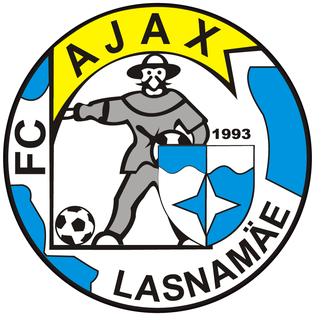
FC Ajax Lasnamäe is an Estonian football club based in Tallinn. They play in the II Liiga East/North zone, the fourth division in Estonian football.

Jalgpalliklubi Tallinna Kalev, also known as Tallinna Kalev or simply Kalev, is an Estonian professional football club based in Tallinn that competes in the Meistriliiga, the top flight of Estonian football. Founded in 1911, it is the oldest active football club in the country. The club's home ground is the Kadriorg Stadium.

SK Tallinna Sport is a defunct Estonian football club. Founded in 1912, Sport won nine domestic league titles and was the most successful Estonian football club before Soviet occupation.

Hiiu Stadium is a football stadium in Tallinn, Estonia. Opened in 1936, it is the home ground of Nõmme Kalju FC. The stadium is located about 8 km southwest of the city centre, in the district of Nõmme. The address of the stadium is Pidu tänav 11, Tallinn.
The Estonia national under-21 football team represents Estonia in international under-21 football competitions and is controlled by the Estonian Football Association (Eesti Jalgpalli Liit), the governing body for football in Estonia.
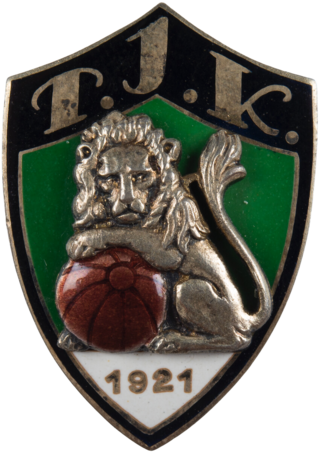
Tallinna Jalgpalli Klubi, commonly referred to as simply TJK, is a defunct Estonian football club, based in Tallinn. Founded in 1921, TJK were one of the founding members of the Estonian Football Championship in 1921. On 4 January 2008, the club merged with SK Legion Tallinn and became TJK Legion.

Tallinna Jalgpalli Klubi Legion, or simply TJK Legion, is an Estonian football club based in Tallinn. On 4 January 2008, Tallinna Jalgpalli Klubi and Tallinna SK Legion merged into this club. The club competes in Esiliiga B, the third-highest division in the Estonian football.

Arnold Pihlak was an Estonian footballer. After joining Austria Vienna in 1928, he became the first-ever Estonian professional footballer.
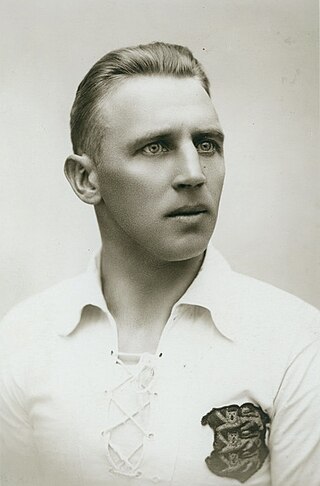
Evald Tipner was an Estonian footballer widely regarded as one of the greatest Estonian goalkeepers of all time. He was capped 66 times for Estonia national football team, 7 times for bandy national team and once for ice hockey team. Tipner was also a good track and field athlete.
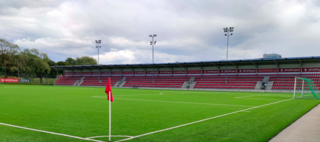
Sportland Arena is an association football stadium in Tallinn, Estonia. Located next to Estonia's largest stadium A. Le Coq Arena, it is part of the Lilleküla Football Complex. The stadium is named after the sporting goods retail company Sportland.

Eugen Einman was an Estonian footballer who played as a right-back for the Estonian national team. He spent most of his career at Tallinna Sport and won a total of eight Estonian Championship titles.
The 2022 Esiliiga B is the 10th season of the Esiliiga B, the third tier of Estonian football. The season began on 3 March 2022 and concluded on 13 November 2022.

Kalevi Aed, also known as Kalevi spordiplats or Kalevi staadion, was a multi-purpose stadium in Tallinn, Estonia. It was the home ground of Tallinna Kalev. Today, Viru Keskus lies on the site of the former stadium.

Tiigiveski Ground was a football ground in Tallinn, Estonia. Opened in 1913, it was the first football specific ground in Tallinn and the first home for the Estonia national football team and for numerous Tallinn football clubs.
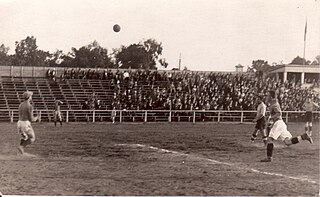
TJK Stadium, also known as TJK jalgpalliväli, was a football stadium in Tallinn, Estonia, and the home of TJK. Opened in 1925, its wooden grandstand could seat 3,740 and with its additional standing capacity of 6,000, the stadium was able to facilitate nearly 10,000 spectators. The stadium was located in the subdistrict of Kadriorg near the Kadriorg beach and the Tallinn Harbour. Today, the site of the former stadium is occupied by Kadriorg's Business Center and Liivaoja apartment buildings.

The Tallinn derby is the name given to a football rivalry between FC Flora and FCI Levadia, two clubs based in Tallinn, the capital of Estonia. First contested in 1999, the fixture is considered to be the fiercest rivalry in Estonian football, with Flora and Levadia being the two biggest and most successful football clubs in the country.



















